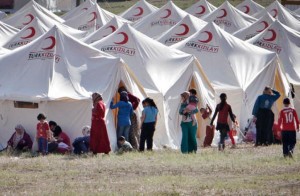Europe’s dangerous course
The most terrible stage yet of Europe’s refugee crisis may have just begun. Fed up with the European Union’s failure to cobble together a common policy that would share the burden fairly, distribute refugees and the risk and provide what succour it can, various countries are unilaterally making up bizarre rules. They are crazily throwing up borders, imposing arbitrary quotas and confusingly creating subregional blocs to prevent the very shadow of refugees from darkening their soil.
A horrific humanitarian crisis is in the making.
The results of Europe’s every-country-for-itself approach became apparent the last weekend in February. An estimated 7,000 people remained miserably stuck on Macedonia’s border with Greece, unable to move in either direction — without tents, food, money or a plan.
This is chiefly because Balkan countries have suddenly and unexpectedly assumed hard-line postures that have thrown Europe’s occasional and imperfect harmony off-balance. Austria, Croatia, Macedonia, Slovenia and Serbia have united to block the entry and passage of refugees.
Austria restricts transit access to 3,200 people per day and will accept only 80 asylum claims a day. Macedonia, Slovenia, Croatia and Serbia have set their own caps on entry — 580 refugees per country per day.
That has left Greece on the front line of Europe’s conflicted emotions over the refugees and Greece is manifestly and understandably unable to cope. It is struggling with deep fiscal cuts imposed in a controversial international bailout deal after six years of recession.
And yet, Athens knows that worse is to come and that much of the humanitarian crisis seems doomed to play out within its borders.
Greek Immigration Minister Ioannis Mouzalas on February 28th grimly predicted that his government was bracing itself for “between 50,000 and 70,000 people trapped in our country in the coming months”. He bravely added that “Greece will not accept becoming Europe’s Lebanon”, a reference to the uncomfortable reality that Lebanon has the world’s largest number of refugees per capita.
Greek Prime Minister Alexis Tsipras added that Greece cannot be condemned by the rest of the European Union to becoming a migrant holding pen or “a warehouse of souls”.
It was a profoundly poetic image for a prosaic and unedifying truth. Europe is in utter disarray about what to do with the unending flow of refugees — already more than 100,000 this year, compared to 5,000 for the same period in 2015. The European chaos is adding to the horrors of harried people’s displacement.
In the end though, the Greek government response is mostly bluster. On its own, Athens can do little to facilitate the onward journey or settlement of the 2,000 or so daily influx of people.
Tsipras and his immigration minister can offer no reasonable response to stranded refugees such as Nedal from Damascus, who described the predicament of thousands stuck on the Macedonian border, saying: “We are three days here: rainy and cold and no food. People have spent all their money. We want just to pass, safely please.”
The European Union and its various policymaking and executive institutions remain catatonic, unable to prescribe a solution or to enforce its acceptance and implementation.
This sense of paralysis was summed up by Austrian Foreign Minister Sebastian Kurz in a stinging defence of Vienna’s unilateralism. “As long as there is no European solution, we will have to take national measures,” he said.
He has a point.
But where do go we from here? What happens next? The European Union has another chance to still the roiling emotions within its member states at its March 17th summit in Brussels. It needs to agree to implement a plan to resettle across the bloc the 160,000 migrants in Greece and Italy. It needs to strengthen mechanisms at its external borders, registering new arrivals, speedily sorting through asylum claims and repatriating those who do not qualify. It must speedily dispatch much-discussed and recently promised financial support to Turkey, Jordan and Lebanon, which bear the burden of the refugee crisis.
Don’t hold your breath.
The alternative will be heartbreaking. With Austria limiting the numbers it will allow to transit to Germany, the single-largest destination for asylum seekers, expect the following fallout. A huge backlog of stranded people in Greece, which will grow exponentially, as Kirk Day, Europe representative of the International Rescue Committee, put it.
“You’ll have upward of 20,000 to 40,000 people getting stuck over the next few days,” Day has said, pointing out that this is a “continent that says it is founded on the principle of human rights. Right now, all we see is a race by countries that don’t want to be the last one to close their borders.”
The second consequence of this race to close borders and take unilateral action is that migrants may switch back to the treacherous route to Europe that runs through violent Libya and across a far greater expanse of sea to Italy.
So perhaps we should expect more drownings?


